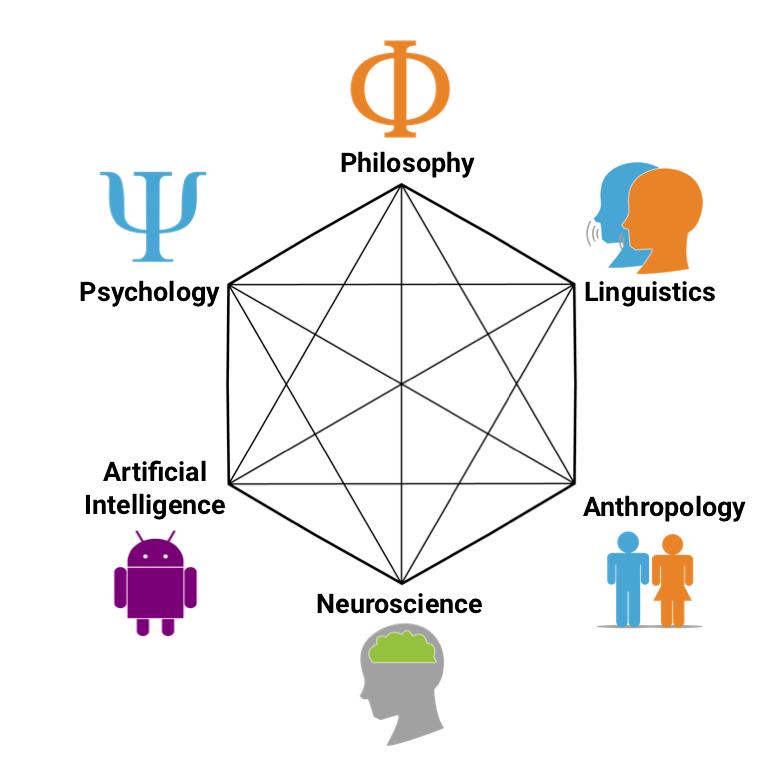Theoriginoftheconcept
AccordingtotheopinionofE.Sheener,DirectoroftheInstituteofCognitiveScienceatAldenUniversity,theterm“cognitivescience”isusedinItwasfirstusedbyLonggateSiekinsin1973,andonlybecamepopularinthelate1970s.In1975,theAlfredP.SloanFoundation(aprivateresearchfundingagencyinNewYorkCity)begantoconsidersupportinginterdisciplinaryresearchprogramsincognitivescience.Thefundingofthefoundationhascontinuedtothisday.Theinstitutionalizationofthisnewdisciplineplayedanimportantrole.BecausetheSloanFoundationplayedadecisiveroleinpromotingcognitivesciencebyorganizingthefirstcognitivescienceconferenceandestablishingaresearchplan.
Mindisthefunctionofthebrainandnerves,andthebridgebetweenthebrainandthemindiscognition.
Cognitivescienceisthetheoryanddoctrineofthestudyofthemind.In1975,thankstotheinvestmentofthefamousSloanFundintheUnitedStates,Americanscholarsintegratedthesixdisciplinesofphilosophy,psychology,linguistics,anthropology,computerscience,andneurosciencetostudy"howinformationistransmittedintheprocessofcognition.""Theresultofthisresearchprojecthasproducedanewsubject-cognitivescience.ThecurrentinternationallyrecognizeddisciplinestructureofcognitivescienceisshowninFigure1ontheright.
Thedevelopmentofcognitivesciencefirstproduced6newdevelopmentdirectionswithintheoriginal6supportingdisciplines.Thesearethephilosophyofmind,cognitivepsychology,cognitivelinguistics(orlanguageandrecognition).Knowledge),cognitiveanthropology(orculture,evolutionandcognition),artificialintelligenceandcognitiveneuroscience.These6emergingdisciplinesarethe6universitybranchesofcognitionandscience.These6supportingdisciplinesintersecteachother,and11newinterdisciplinarydisciplinesemerge:(1)Cybernetics;(2)Neurolinguistics;(3)Neuropsychology;(4)CognitiveProcessSimulation;(5)ComputationalLinguistics;(6)Psycholinguistics;(7)PhilosophyofMind;(8)PhilosophyofLanguage;(9)LinguisticsofAnthropology;(10)CognitiveAnthropology;(11)BrainEvolution.
Detailedintroduction
Historicalorigin
Whatdoescognitivesciencedo?Whatwillitbringus?TheanswertothesequestionsfirstinvolvescognitionThevalueandsignificanceofscienceitself.
Cognitionistheprocessandactivityofthebrainandnervoussystemtoproducethemind.Generallyspeaking,anyanimalwithabrainandnervoussystemhasacertaindegreeofmind.Cognitivescienceisasciencethattakesthecognitiveprocessanditslawsastheresearchobject.Cognitioninvolveslearning,memory,thinking,understanding,andotherbehaviorsthatoccurinthecognitiveprocess.Therefore,languageandpsychology,brainandnervesareimportantresearchcontentsofcognitivescience.Asfarasthehumanmindisconcerned,becausehumansaresocialanimals,languageandphilosophy,cultureandevolution,aswellashuman-specifictools-computersandtheirscientifictheories,havealsobecometheobjectofcognitivescienceresearch.
Sincemoderntimes,evenasfarbackasancienttimes,theproblemofbodyandmindhasalwaysbeenafundamentalproblemthatplaguedphilosophers.Descartes'famousproposition"Ithink,thereforeIam"reflectstheessentialcharacteristicsofhumanbeingstorecognizethemselves.His"bodyandminddualism"isanimportantversionoftheproblemof"bodyandmind"(Body&Mind).
Sincethemiddleofthe20thcentury,duetothedevelopmentofpsychology,brainandneuroscience,especiallyaftertheestablishmentofcognitivescience,thisproblemhasbecomethefamous"Brain&Mind"problem.Obviously,thestudyof"mind"and"brain"incognitivescienceisverydifferentfromthestudyofphysicalandmentalissuesinthehistoryofphilosophyandscience.Themaindifferenceisthatcognitivescienceisnolongerthestudyofmind.Philosophicalspeculationisnotonlyempiricalresearchinasinglesubjectsuchaspsychologyandphysiology,butacomprehensivemulti-disciplinaryresearchbasedonthedevelopmentofbrainscience.
Theimportantprogressofcognitivesciencehasbenefitedfromthedevelopmentofbrainscience,andthedevelopmentofbrainsciencehasbenefitedfromthegreatprogressofbrainimagingtechnology.ComputerizedTomography(CT),MagneticResonanceImaging(MRl),FunctionalMagneticResonanceImaging(fMRl),PositronEmissionTomography,PET)andothertechnologiesarewidelyusedintheresearchofbrainandneuroscience,whichhaspromotedthedevelopmentofbrainandneuroscience.Thesedevelopmentsinbrainsciencehavepreparedtheconditionsforustorevealthesecretsofhumanwisdom.
In2000,whenmankindhadjustcrossedthethresholdofthenewcentury,theNationalScienceFoundation(NSF)andtheUSDepartmentofCommerce(DOC)jointlyfundedmorethan50scientiststocarryoutaresearchprojectwiththepurposeofItisnecessarytofigureoutwhichdisciplinesaretheleadingdisciplinesinthenewcentury.
Theresultoftheresearchisaresearchreportofmorethan680pages,buttheconclusionisonly4letters-NBIC.TheystandforNanotechnology,Biotechnology,InformationTechnology(Informationaltechnol-ogy),andCognitivescience.
ThisresearchreportdescribestheresearchgoalsofNBICasfollows:"Inthenextcentury,orwithinabout5generations,somebreakthroughswillappearinnanotechnology(eliminatingnaturalandartificialTheboundariesbetweenthemolecularsystemsoftheworld),informationscience(towardmoreautonomousandintelligentmachines),biologicalsciencesandlifesciences(toextendhumanlifethroughgeneticsandproteology),cognitionandneuroscience(creatingartificialnerves)Internetanddecipheringhumancognition)andsocialsciences(understandingculturalinformation,controllingcollectiveintelligence),thesebreakthroughsareusedtoacceleratethepaceoftechnologicalprogress,andmayonceagainchangeourspecies,itsfar-reachingsignificancecanbecomparabletodozensItisthefirsttimebeforethegenerationsofpeopletolearnorallanguageknowledge.ThetechnicalintegrationofNBICS(Nano-Bio-Information-Cognition-Society)maybecomethepropellerofgreathumanchange."[3](P102)ThisimportantresearchreporthasOnesentenceisveryclassic:"Theaggregationtechnology(NBIC)isguidedbycognitivescience.Becauseoncewecanusethefourlevelsofhow,why,where,andwhenTounderstandthinking,wecanusenanotechnologytomakeit,usebiotechnologyandbiomedicinetorealizeit,andfinallyuseinformationtechnologytomanipulateandcontrolittomakeitwork."
ResearchFieldsh3>
Someresearchfieldsofcognitivescienceinclude:languageacquisition,reading,discourse,mentalmodelsmallconceptsandinduction,problemsolvingandcognitiveskillsacquisition,visualcalculation,visualattention,memory,behavior,motorplanningGeometryandmechanicalissuesin,cultureandcognitiontwophilosophicalissuesincognitivescience,physicalandmentalissues,intentionality,perceivablequalities(Qualia),subjectivityandobjectivity,etc.
Themeaningofthegoal
Fundamentallyspeaking,thegoalofcognitivescienceistouncoverthemysteriesofthehumanmind.Howtoaccomplishthismission?Atpresent,itisexploringandresearchingfromsuchaspects.Intermsofbasictheories,cognitivescienceresearchcomputingandcognition,symbolicstructureandcognition,mentalstructureandconnectionism,grammaticaltheory,modeltheorysemanticsandothersemantics,experimentalmethodsofcognitivescience,brainandcognition,etc..
Thegoalandsignificanceofcognitivescienceisalsothatitwillcombinewithnanotechnology,biotechnologyandinformationtechnologytochangethewayofhumanexistenceinthe21stcentury.
Theothersignificanceofthedevelopmentofcognitivescienceisthatitwilldrivethedevelopmentofotherrelateddisciplines.Itcanbesaidthatinthe21stcentury,ifcognitivescientificresearchisnotdoneorcombinedwithcognitiveresearch,notonlyphilosophy,psychology,linguistics,anthropology,computerscience,brainandneurosciencecannotbedevelopedindepth,othertraditionaldisciplinesForexample,thedevelopmentofmathematics,physics,astronomy,geography,biology,literature,history,economics,politicalscience,law,managementscience,andpedagogycannotbefurtherdeveloped,becausethedeephumandevelopmentofthesedisciplinesdependsonthebrain.Itisrelatedtothedevelopmentofthemind,andthereforetocognitivescience.
Takethedevelopmentofphilosophyasanexample.Intheearlystageofhumancognition,peoplecasttheirconsciousnesstotheoutsideworld,thinkingaboutwhattheoriginoftheworldis.Thisistheancientontologicalphilosophy.Aftermoderntimes,theobjectofphilosophicalresearchhasturnedtothesubjectitselftostudythequestionofhowcognitionispossible.Itisthemodernepistemologicalphilosophy;afterthemiddleofthe20thcentury,philosophicaleyesbegantoturntothelanguageoftheintermediatelinkbetweenthesubjectandtheobject.ThisisthecontemporaryWesternphilosophyoflanguage;intheresearchprocessoflinguisticsandphilosophyoflanguage,linguistsandphilosophersoflanguageWefoundthatlanguageisareflectionofthemind,andthemindisafunctionofthebrain.Manyofthemhavemovedfromlanguageresearchtomindandcognitionresearch.Chomskysaid:"Languageisthemirrorofthesoul."Searlesaid:"Languageisthebasicfunctionofthehumanmind."Afterthemid-1970s,theobjectofphilosophynaturallyturnedtothehumanmind.Searlebelievesthat"themostimportantdevelopmentincognitivescienceisthetransferofcognitivescientistsfromthecomputationalmodelofcognitivesciencetothecognitiveneurosciencemodel.ThisshowsthatthebrainasthebasisofcognitionhasreplaceddigitalcomputersasthecognitiveFoundation.Weregardtheneurobiologicalbrainasthefoundationofhumancognition.Thisisaveryimportantchange."Healsosaid:"Themostpromisingresearchfieldiscognitiveneuroscience,notjustbrainmicro-nanotechnology.Thehopeliesincognitiveneuroscience,andIthinkthisistheareawherethemostexcitingresearchresultswillappear."
FutureVision
Firstofall,cognitivescienceresearchwillcrackthemysteryofthehumanmind.Itsultimategoalistocreateanartificialneuralnetworksystem.AccordingtotheartificialintelligencemodelofJohnR.Searle,thecurrentcomputersystemisnotintelligent,whiletheartificialneuralnetworksystemisanintelligentsystemwithhumanbrainfunctions.Justimaginethepossibleapplicationsofartificialneuralnetworksystemsinmodernscienceandtechnologyandhumanreallife.Theimportanceofcognitivescienceisself-evident.
Secondly,ofthefourleadingdisciplinesNBICinthe21stcentury,cognitivescienceisthemostimportant,anditistheleadingsubjectamongthefourleadingdisciplines.Thecombinationofcognitivescienceandnanotechnology,biotechnologyandinformationtechnology,togetherwiththedevelopmentofsocialsciences,willfundamentallychangethewayhumanbeingslive,andevenourspecies.
ThemysteryofthehumanmindiscalledthelastsecretofGod,becauseoncethemysteryofthehumanmindisrevealed,Godhasnosecretstospeakof.Therefore,somepeople(includingsomescientists)assertthatthisgoalofcognitivescienceissimplyimpossibletoachieve.It'snotthatGoddoesn'tletusachieveit,butwecan'tdoitourselves.Itisimpossibleforasystemtorecognizeitsownmovement.Thisisabasiclawofsystemscience.
Ifthisisthecase,whyshouldhumanstrytounderstandthemselves?Thisisbecausemostscientistsbelievethathumans’attemptstounderstandthemselvesdonotviolateanyscientificlaws.Humanbeingshavetheabilitytorecognizethemselvesbecausetheirthinkingcanpointtothemselves-thisisself-awareness.Amongallanimals,onlyhumansandadvancedprimatessuchasgorillashaveself-awareness.Notonlythat,peoplealsohaveself-referentiallanguagethatcanreflectthisself-consciousness.Self-awarenessandself-referentiallanguageareoneofthefundamentalsignsthatdistinguishhumansfromotheranimals.Therefore,humanbeingscanrecognizethemselves.
Asaninevitableproductofscientificdevelopment,cognitivescienceisnotonlyidenticalwithscienceitself,butalsoverydifferent.Cognitivesciencecanevenberegardedasakindof"rebellion"ofpastscientifictheories.Beforetheemergenceofcognitivescience,scientifictheoriessolvedtheuniversalproblemofcognition:scientificprinciplesapplytoallpeople.Thedevelopmentofcognitivesciencehastosolvetheproblemofindividualdifferencesincognition:cognitivesciencewillprescribedifferentprescriptionsforeachperson.Cognitivescienceis"embodied",whichstudiescognitiveproblemsrelatedtotheindividual'sbodyandmind.
Disagreements
Cognitivescienceisnotyetmature,andasanindependentdiscipline,ithasnotyetbeensufficientlyunifiedandintegrated.Therearealsogreatdisagreementsastowhatcognitivescienceis.OnOctober1,1978,the"CommitteeontheStateofCognitiveScience"submittedareporttotheSloanFoundation(Schiller,ShiQi,1989),whichdefinedcognitivescienceas"theinteractionbetweenintelligententitiesandtheirenvironment"Principleresearch".Then,thereportauthorsexpandedthisdefinitionintwodirections.Thefirstoneisextended:itenumeratesthesub-fieldsofhumancognitivescienceandthecross-connectionsbetweenthem.Thesub-fieldslistedarecomputerscience,psychology,philosophy,linguistics,anthropology,andneuroscience.Thesecondexpansionisconnotative,pointingoutthatthecommonresearchgoalisto"discovertherepresentationsandcomputingpowerofthemind,aswellastheirstructuralandfunctionalrepresentationsinthehumanbrain."Theabovedefinitionofcognitivescienceembodiestheparadigmof"symbolicprocessing"or"informationprocessing".Butwiththere-emergenceofconnectionisminthemid-1980s,thedefinitionofcognitivesciencehasundergoneextremelysubtlechanges.Thedisputebetweensemioticismandconnectionismmainlyaffectstheconnotationofthedefinitionofcognitivescience,buthasnoinfluenceonitsextension,becausethesetwoparadigmscanincludetheabove-mentionedsubdisciplinesofcognitivescience..
Theinterestofcognitivescientistsistostudyhowpeopleobtain,process,maintainanduseinformation,anduseitasthebasisforbehaviorandsubsequentknowledge.Theyusetwobasicstrategiestostudytheseissues.Thefirststrategyistoestablishacomputermodelofthecognitiveprocess,suchasmakingadecision,andthencomparingthemodel'soperatingstatuswiththebehaviorofhumansubjectsundersimilarconditionstofurtherimprovethemodel.Becausethismethodreliesoncomputersratherthanhumanbrains,itissometimesreferredtoasa"drycognitivescience"(DCS)strategy.Thesecondstrategyistostudytheeffectsofelectricalorchemicalstimulationontherealbrain,observetheeffectsofbraininjury,orrecordthebrainactivitiesofsubjectswhoareperformingvariousinformationprocessingtasks.Becausethismethodreliesontherealbrain,itisoftencalledthe"wetcognitivescience"(WCS)method.Ontheissueofthenatureofthementalstateanditsrelationshipwiththematerialworld,thesetwodifferentexperimentalmethodshaveledtotwoinconsistentviews.

DryCognitiveScience
Cognitivescientistswhoholdtheviewpointofcognitivescienceoftencomparethehumanbrainwithcomputerstoexplaintheconnectionbetweenthematerialworldandthespiritualworld..Insidethecomputer,thedifferentstatesofthetransistorsrepresentdifferentimagesorsounds,andvariouscomputerprogramsprocessthesestoredpatterns.Thisprocessislikescanningapictureintoacomputer,andthenusingasoftwarelikeAdobePhotoshoptoprocesstheimage.Ofcourse,wecanalsousecamerastoobtainimages,andusemoresophisticatedsoftwaretoidentifyobjects,lettersorwordsintheimage.Thisisexactlyhowtheintelligentrobot"brain"works.
Thiskindofcomputermetaphorcaneasilyleadpeopletobelievethatnervecellsinthebrainplayasimilarroletocomputertransistors.Inotherwords,theimagereflectedinoureyesisquicklyconvertedintoapatternofnerveimpulse,andthenthesoftwareprogramofthevisualsystemprocessesthisneuralpattern.Neuralmodelssimplycorrespondtothecharacteristicsofexternalthings,whilecognitiveprocesses,suchasobservationandthinking,reflectthecalculationproceduresforoperatingandprocessingthesesymbols.
MostsupportersofDCSregardthebrainasageneralbiologicalcomputerthatcanrunavarietyofsoftwareprograms.Becausethesamecomputerprogramcanrunondifferentgeneral-purposecomputerssuchasMacintoshandIBM,DCSbelievesthattheactualstructureofthebrainisirrelevantforunderstandingmentalprocesses.
NotallDCSworkersagreewithallthedetailsofthemachine-brain(Figure2)analogy.Someresearchersbelievethatwhenwelookataredapple,thereisnoredinourmind,butonlythestateofnervecells.Thisstatecorrespondstotheattributesoftheexternalworld,suchastheredcoloroftheapple.Othersbelievethatconsciousexperiences,suchasred,areproducedinthenervoussystem,buttheyaremerelyunrelatedsidephenomenawithnofunctionaleffect.This"red"islikethebuzzingnoiseofacomputer.Itisproducedbybrainactivity,butinfactitisnotimportantbecauseithasnothingtodowiththeworkofnervecellsandtheirprogrammedinteractions.Inotherwords,subjectiveexperiences,suchasred,arenotreallynecessary,butmerelyaccidentalby-productsofthenervoussystemperformingfunctions.Althoughthereareotheropinions,DCSgenerallyagreesthatthebrainbehaveslikeacomputer,perhapsaparallelprocessor,andthementalfunctionisasoftwareprogramexecutedbythisgeneral-purposemachine.
WetCognitiveScience
WetCognitiveScienceputsforwarddifferentviewsonthenatureofthementalstateofconsciousnessbasedontheresultsofresearchontherealbrain.Manyyearsago,neuroscientistslearnedthatstimulation,injury,orslightchangesinneurochemistryinthebraincanaffectalmostallaspectsofthehumanspirit.Forexample,acertaindoseofFluoxetinecanrelievedepressionformanyyears.Electricalorchemicalstimulationofthebraincaneasilychangesensationandperception.Ourexperienceofrealitydependsmoreonthechemicalreactionsinsidethebodythanontheexternalworldoutsidethebody.Theinputofinformationfromthe"outside"worldisnotevennecessaryfortheformationofconsciousexperience.
Itseemsthattheconsciousnesscharacteristicsofourspirit,suchasfeelingsandemotions,arecloselyrelatedtothephysicalandchemicalstructureofthebrain,andtheirproductiondoesnotrequiretheintroductionofanyexternalinformation.Wecanseeredapplesinourdreams,andnolightenterstheeyesatthistime.
Themainconclusionofwetcognitivescienceisthatmentalconsciousnessattributes,suchasfeelingsandemotions,aretheproductofthephysicalandchemicalcompositionofthebrain.Thisviewiscompletelydifferentfromtheviewofdrycognitivesciencethattreatsthebrainasageneral-purposecomputer.Traditionaldrycognitivesciencebelievesthatthereisnoredincomputersandhumanbrains,butonlysymbolsthatrepresenttheattributesoftheseexternalworlds.Onthecontrary,theresultsofwetcognitivescienceclearlyshowthatconsciousexperienceisaproductofthenervoussystemandcanbeinducedbybrainchemicalorelectricalstimulationevenintheabsenceofenvironmentalinformationinput.Wetcognitivescienceitselfdoesnotexplainhoworwhywehaveconsciousexperience,butitclearlystatesthatconsciousexperienceisproducedbytheneuralactivityofthehumanbrain.
Contentinvolved
Theunderstandingofthescopeofcognitivesciencecanalsobeseenfromthecontentofcognitivescience.Sofar,themaincontentinvolvedincognitivesciencehasasenseofperception.(Includingpatternrecognition),attention,memory,language,thinkingandrepresentation,consciousness,etc.Thisseemstobetheconcernofpsychologists,butitisalsotheconcernofphilosophers,linguists,computerscientists,neurophysiologists,andanthropologists.It'sjustthatresearcherswithdifferentprofessionalbackgroundshaveadopteddifferentspecificresearchmethodsforthesesameproblems.ChinesescholarLiBoyuepointedoutthatartificialintelligence,cognitivepsychologyandpsycholinguisticsarethecoredisciplinesofcognitivescience,andneuroscience,anthropologyandphilosophyareperipheraldisciplinesofcognitivescience.
Duetothecomplexityofthecognitivesystem,itneedstobestudiedinmultipledimensions.Cognitivescienceneedstousethetoolsandmethodsusedinmultipledisciplinestofullyunderstandthecognitivesystem.Comprehensivestudyoforientation.Itcanbesaidthattheachievementsofcognitivesciencesofararecloselyrelatedtoitsinterdisciplinaryresearchmethods.However,interdisciplinaryresearchmethodshavealsobroughtmanyproblemsandchallengestocognitivescience.
Cognitivescienceisthesciencethatstudiestheinformationprocessingprocessofhumanperceptionandthinking,includingfromsensoryinputtocomplexproblemsolving,fromhumanindividualstohumansociety’sintelligentactivities,andthenatureofhumanintelligenceandmachineintelligence.Cognitivescienceistheresultoftheinterdisciplinarydevelopmentofmodernpsychology,informationscience,neuroscience,mathematics,scientificlinguistics,anthropologyandevennaturalphilosophy.
Theriseanddevelopmentofcognitivescienceindicatesthattheresearchonhuman-centeredcognitionandintelligentactivitieshasenteredanewstage.Theresearchofcognitivesciencewillenablehumanself-understandingandself-control,andraisehumanknowledgeandintelligencetounprecedentedheights.Thephenomenaoflifeareintricateandcomplicated,andmanyproblemshavenotbeenwellexplained,andthecontentthatcanbelearnedfromitisalsonumerousandmultifaceted.Howtoextractthemostimportantandcriticalissuesandcorrespondingtechnologiesfromitisalong-termgoalpursuedbymanyscientists.Tosolvemanyofthedifficultiesfacedbymankindinthe21stcentury,suchasthehugedemandforenergy,environmentalpollution,resourceexhaustion,populationexpansion,etc.,relyingsolelyonexistingscientificachievementsisnotenough.Wemustlearnfrombiologyandfindnewwaysoftechnologicaldevelopment.
Perception
Theexpressionofperceptualinformationisthebasicproblemofperceptualresearch,anditisthebasisforstudyingothercognitiveprocessesatvariouslevels.Wheredoestheperceptionprocessstart?Whichvariablesintheexternalphysicalworldhavepsychologicalperceptualsignificance?Whatistheobjectofcalculationasacomputationalmodelofperception?Thesequestionssurroundingtheexpressionofperceptualinformationarequestionsthatmustbeansweredfirsttoestablishanyperceptualandperceptual-relateddoctrinesandtheoreticalmodels,whetheritisahumanoracomputer.Theresearchofperceptualinformationexpressioncanhavedifferentlevelsofproblems,includingproblemssuchasperceptualorganization,perceptuallearning,perceptualdynamicmemory,andfacerecognition.
Combiningcognitiveneuroscienceexperimentalresearchandcomputervisionresearchatthelevelofcomputationaltheory,brainknowledgeexpression,andcomputerrealization,itwillproposenewtheories(orthoughts)totheabove-mentionedscientificproblems.)Andthesolution.
Learning
Learningisabasiccognitiveactivity,aprocessofaccumulatingexperienceandknowledge,andaprocessofgraspingandunderstandingexternalthingsinordertoimprovetheperformanceofsystembehavior..
Theneurobiologicalbasisoflearningistheplasticityofsynapsesintheconnectionstructurebetweennervecells,whichhasbecomeaveryactiveresearchfieldincontemporaryneuroscience.Theconditionofsynapticplasticityisthatwhenthepresynapticfiberandtheassociatedpost-synapticcellareexcitedatthesametime,thesynapticconnectionisstrengthened.In1949,CanadianpsychologistHebbproposedtheHebblearningrules.Heassumedthatrelatedsynapseschangedduringthelearningprocess,leadingtotheenhancementofsynapticconnectionsandtheimprovementoftransmissionefficiency.Hebblearningrulesbecomethebasisofconnectedlearning.Aneuralnetworkisawidelyinterconnectednetworkcomposedofadaptablesimpleunits.Kohonenproposedaself-organizingmappingnetwork.Accordingtothelawofsynergytoformastructureandcompetitiontopromotedevelopment,Hakenorganicallycombinedthenonlineardynamictheoryofsynergywithneuralnetworks,andproposedacollaborativeassociativememorynetwork.Amariproposedtousedifferentialmanifoldandstatisticalreasoningtostudyneuralnetworks.OnthebasisofAmaritheory,ShiZhongzhietal.proposedaneuralfieldmodel,whichiscomposedofafieldorganizationmodelandafieldeffectmodel.
Perceptuallearningislearningthatoccursattheperceptuallevel.Itmainlystudieshowtoobtainrelevantabstractdatafromtherawdatainputbylow-levelsensors.Perceptuallearningmainlyconsiderslearningthroughvisionandhearing,studyingthetransformationmethodsfromnon-structuralandsemi-structuralinformationtostructuralinformation,studyingthesemanticdescriptionofimagesanditsrapidextractiontechnology,studyingtheattentionmechanismandmetacognitioninperceptuallearning.
Cognitivelearningtheorybelievesthatthereisacorrespondingthinkingprocessbehindpeople’sbehavior.Behaviorchangesareobservable,andlearners’inneractivitiescanalsobeinferredthroughbehaviorchanges.Incognitivelearningtheories,suchasthemeaningfullearningtheory(alsoknownasassimilationtheory)proposedbyAusubel,itscoreideaisthattheacquisitionofnewinformationmainlydependsontheexistingconceptsinthecognitivestructure;meaninglearningisthroughnewinformationandlearningTheinteractionoftheexistingconceptsinthecognitivestructureofthereadercanoccur;asaresultofthisinteraction,itleadstotheassimilationofthemeaningofthenewandoldknowledge.TheinformationprocessinglearningtheoryproposedbyGagnecomparesthelearningprocesstotheinformationprocessingprocessofacomputer.Thelearningstructureconsistsofasensoryregister,short-termmemory,long-termmemory,controller,andoutputsystem.Thecognitiveprocesscanbedividedintoselectivereception.,Monitoring,adjustment,retelling,andreconstruction.Inthisinformationprocessingprocess,theverykeypartistoperformcontrolandexpectation.Executioncontrolreferstotheinfluenceoftheexistinglearningexperienceonthecurrentlearningprocess,andtheexpectationreferstotheinfluenceofthemotivationsystemonthelearningprocess.Theentirelearningprocessiscarriedoutundertheactionofthesetwoparts.
Introspectivelearningisalearningprocessofself-reflection,self-observationandself-knowledge.Withthesupportofdomainknowledgeandexamplelibrary,thesystemcanautomaticallyselectandplanmachinelearningalgorithms,andbetterconductknowledgediscoveryofmassiveinformation.
Implicitlearningistheprocessofunconsciouslyobtainingcomplexknowledgeaboutthestimulatingenvironment.Inimplicitlearning,peopledonotrealizeorstatewhattherulesgoverningtheirbehaviorare,buttheylearnsuchrules.Afterthemid-1980s,implicitlearninghasbecomethehottestandmostconcernedsubjectinthepsychologyfield,especiallyinthefieldoflearningandcognitivepsychology,andhasbecomeoneofthemostimportantsubjectsthatwillhaveaprofoundimpactonthedevelopmentofcognitivepsychology..Implicitlearninghasthefollowingthreecharacteristics:
Theimplicitknowledgecanbeautomaticallygeneratedwithoutconsciouslydiscoveringtheexplicitrulesoftaskoperation;
Implicitlearningisgeneralized,Itiseasytogeneralizetodifferentcollectionsofsymbols;
Implicitlearningisunconscious,andtheknowledgeacquiredimplicitlycannotgenerallybeexpressedinlanguagesystems.
Language
Duringhumanevolution,theuseoflanguagehasdifferentiatedthefunctionsofthetwohemispheresofthebrain.Theemergenceofthelanguagehemisphereclearlydistinguisheshumansfromotherprimates.Somestudieshaveshownthatthelefthemisphereofthehumanbrainisrelatedtoserial,sequential,andlogicalanalysisofinformationprocessing,whiletherighthemisphereisrelatedtoparallel,visual,andnon-sequentialinformationprocessing.
Languageisasystemcomposedofspeechasitsshell,vocabularyasmaterials,andgrammarasrules.Languagesareusuallydividedintotwocategories:spokenandwritten.Theformofexpressionofspokenlanguageissound,andtheformofexpressionoftextisimage.Spokenlanguageisfarolderthanwrittenlanguage.Individualslearnspokenlanguagefirstandthenwrittenlanguage.
Languageisthemostcomplex,systematic,andmostwidelyusedsymbolsystem.Languagesymbolsnotonlyrepresentconcretethings,statesoractions,butalsoabstractconcepts.ChineseissignificantlydifferentfromIndo-Europeanlanguageswithitsuniquemorphologyandsyntaxsystem,writingsystemandphonetictonesystem,andhasauniquestylethatcombinessound,formandmeaning.Conceptsarethinkingpatternsthatreflecttheuniqueattributesofthings,andconceptsarecloselyrelatedtowords.Theemergenceandexistenceofconceptsmustdependonwords.Wordscanexpressotherthingsbecausepeoplehavecorrespondingconceptsintheirminds.Therefore,wordsarethelinguisticformofconcepts,andconceptsaretheideologicalcontentofwords.
ThestudyofChinesefromthethreelevelsofneurology,cognitionandcalculationgivesusanexcellentopportunitytoopenthedoorofintelligence.ThestudyofcognitivepsychologyinChinesehasahistoryofmanyyearsandhasachievedworld-classresearchresults.However,thesestudiesmostlyfocusonChinesecharactersandvocabulary,andthehigher-levelsyntaxandsentenceprocessingstillneedtobeexploredindepth.Thestudyoftheentirespeechchainisnotsystematicenough,especiallynotmuchisknownaboutthelanguageprocessingmechanismofthebrain.Inthefieldofintelligentsystems,mycountryattachesgreatimportancetoChinesecomputerinformationprocessing,andhasinvestedalotoffundstosupporttheresearchanddevelopmentofcomputationallinguistics,machinetranslationandnaturallanguageunderstandingsystems,andhasachievedalargenumberofimportantresults.Butonthewhole,therearemanyunresolvedproblemsintheintelligentprocessingoflanguageinformation.Thesolutionmustbebasedontheresearchofcognitivescienceandguidedbynewtheoriestomakeabreakthrough.
In1991,MayeuxandKandelproposedanewlanguageinformationprocessingmodelbasedontheWernicke-Geschwindmodel.Thelanguageinformationofauditoryinputistransmittedfromtheauditorycortextotheangulargyrus,thentotheWernickearea,andthentotheBrocaarea.ThelinguisticinformationofvisualinputisdirectlytransmittedfromthevisualjointcortextotheBrocaarea.Thevisualperceptionandauditoryperceptionofawordareprocessedindependentlyofeachotherbypathwayswithdifferentsensorypatterns.ThesepathwayseachindependentlyreachtheBrocaarea,aswellashigher-levelareasrelatedtolanguagemeaningandlanguageexpression.Theworkingmechanismofeachstepofthelanguageprocessingpathwayinthebrainneedstobestudiedindepth.
Usingmathematicalmethodstostudylanguage,lookingforforms,modelsandformulasoflanguagestructure,sothatthegrammaticalrulesofthelanguagecanbesystematicandformalizedlikemathematicalsymbolsandformulas,andcanbeusedtogenerateinfinitesentence.ThefamousAmericanlinguistChomskyproposedtheformalgrammaroflanguagein1956,whichestablishedatheoreticalfoundationforlanguageinformationprocessing.In1996,YipandSussmanproposedtheuseoftwo-wayconstrainedpropagationmechanisminphoneticsrulestoexplainhowneural-levelauditorysignalscorrespondtothinking-levelsymbols.
Itisworthmentioningthatmachinetranslationinvolvesmanydisciplinessuchaslinguistics,computerscience,cognitivescience,mathematics,etc.,andisacutting-edgeinterdisciplinarysubject.Thischallengingresearchfieldisrankedfirstamongthetoptenscientificandtechnologicalproblemsintheworldinthe21stcentury.However,intermsofexistingachievements,thetranslationqualityofthemachinetranslationsystemisstillfarfromtheultimategoal;andthequalityofthemachinetranslationsystemisthekeytothesuccessorfailureofthemachinetranslationsystem.
ProfessorZhouHaizhong,aChinesemathematicianandlinguist,oncepointedoutinthepaper"FiftyYearsofMachineTranslation":Toimprovethequalityofmachinetranslation,thefirstthingtosolveistheproblemoflanguageitselfratherthantheproblemofprogramming.;Itiscertainlyimpossibletoimprovethequalityofmachinetranslationbyrelyingonafewprogramsasamachinetranslationsystem.Inaddition,itisimpossibleformachinetranslationtoachieve"faithfulness,expressiveness,andelegance"whenhumanshavenotyetunderstoodhowthehumanbrainperformsthefuzzyrecognitionandlogicaljudgmentoflanguage.Thesearethebottlenecksrestrictingtheimprovementofmachinetranslationquality.
Memory
Memoryisthereflectionofthehumanbraintowhathashappenedinthepastexperience,anditisthepreservationofnewlyacquiredbehaviors.Becauseofmemory,peoplecanmaintainthereflectionofthepast,makethecurrentreflectiononthebasisofthepreviousreflection,andmakethereflectionmorecomprehensiveandin-depth.Thatis,onlywithmemorycanoneaccumulateexperienceandexpandexperience.
Therearethreetypesofhumanmemory:sensorymemory,short-termmemoryandlong-termmemory.Afterthestimulusceases,itsinfluencedoesnotdisappearimmediately,andanafterimagecanbeformed.Thevisualafterimageisthemostobvious.Theafterimagecanbesaidtobethemostdirectandprimitivememory.Afterimagescanonlyexistforashortperiodoftime.Forexample,themostvividvisualafterimagesonlylastfortensofseconds.Thisissensorymemory.Thetimeintervalofshort-termmemoryislongerthanthatofsensorymemory.However,thetimetostorematerialsisonlyaboutoneminuteorevenshorter.Long-termmemoryreferstothestorageofinformationformorethanoneminute.Humanmemorycanbedividedintoproceduralmemoryandpropositionalmemory.Processmemoryistomaintaintheskillsrelatedtotheoperation,whichismainlycomposedofperceptualmotorskillsandcognitiveskills.Propositionalmemoryistostoreknowledgerepresentedbysymbolsandreflecttheessenceofthings.Propositionalmemoryisfurtherdividedintoepisodicmemoryandsemanticmemory.Theformerisaformofmemorythatstorespersonaleventsandexperiences.Thelatteristostoretheknowledgeofthenatureoftheeventthattheindividualunderstands,thatis,toremembertheknowledgeabouttheworld.
In1974,BaddeleyandHitchproposedthethree-systemconceptofworkingmemorybasedonexperimentsthatsimulatedshort-termmemoryimpairment,replacingtheoriginalconceptof"short-termmemory"with"workingmemory".Baddeleybelievesthatworkingmemoryreferstoasystemthatprovidestemporarystoragespaceandinformationnecessaryforprocessingforcomplextaskssuchasspeechcomprehension,learning,andreasoning.Theworkingmemorysystemcanstoreandprocessinformationatthesametime.Theconceptoftemporalmemoryonlyemphasizesthatthestoragefunctionisdifferent.Workingmemoryisdividedintothreesub-components,whicharethecentralexecutionsystem,thevisualspacepreliminaryprocessingsystem,andthephoneticloop.Alotofbehavioralresearchandneuropsychologicalevidenceshaveshowntheexistenceofthethreesubcomponents,andtheunderstandingofthestructureandfunctionofworkingmemoryisconstantlyenrichedandperfected.Peoplefindthatworkingmemoryiscloselyrelatedtolanguagecomprehension,attentionandreasoning,andworkingmemorycontainsthemysteryofintelligence.
Attention
Sincethemid-1950s,withtheriseofcognitivepsychology,peoplehavere-recognizedtheimportanceofattentionintheinformationprocessingofthehumanbrain,andseveralattentionmodelshavebeenproposed.Therepresentativeonesaretheattentionfilteringmodelandtheattenuationmodel,whichbelongtotheperceptualselectionmodel.Thesetwomodelsplacetheattentionmachineintheperceptualstageofinformationprocessing,andrealizeinformationselectionbeforerecognition.Incontrasttotheperceptualchoicemodelistheresponsechoicemodel,whichbelievesthattheroleofattentionisnottoselectstimuli,buttoselectresponsestostimuli.Themodelbelievesthatallinformationcanentertheadvancedprocessingstage,butonlythemostimportantinformationwillcausethecentralsystemtorespond.Theemphasisofthesetwotypesofmodelsisdifferent.Theperceptualchoicemodelemphasizesconcentratedattention,whilethereactivechoicemodelemphasizesdistributedattention.Thefocusofthedisputebetweenthetwoisthepositionoftheattentionmechanismininformationprocessing.Thecentralenergymodelofattentionwasproducedinthiscontext.Thetheoreticalbasisofthismodelisthelimitedprocessingcapacityoftheinformationsystem.Itavoidstheproblemofthepositionofattentionmechanismininformationprocessing,andunifiestheexperimentalresultsoftheperceptualchoicemodelandtheresponsechoicemodelinform;butthedisadvantageisthatitdoesnotrevealtheinformationprocessingprocessinvolvedinattention.
Withtherapiddevelopmentofbrainimagingtechnologyandneurophysiologicalresearch,effortstoseparatetheattentionnetworkfromotherinformationprocessingsystemshavebecomeareality.Usingpositronemissiontomography(PET)andfunctionalmagneticresonanceimaging(fMRI)technology,itispossibletomoreaccuratelymeasurethechangesincerebralbloodflow(rCBF)invariousareasofthebrainwhencompletingspecificattentiontasks,soastodeterminethefunctionofeachattentionsub-networkStructureandanatomicalpositioning.Intheearly1980s,thefeatureintegrationmodelproposedbyTreismancloselyintegratedattentionandtheinternalprocessofperceptualprocessing,andusedthe"spotlight"tovividlymetaphorthespatialselectivityofattention.Accordingtothismodel,thevisualprocessingprocessisdividedintotwointerrelatedstages,namelypre-attentionandconcentratedattention.Theformerperformsfastandautomaticparallelprocessingofsimplefeaturessuchascolor,orientation,andmovementofvisualstimuli.Variousfeaturesarecodedseparatelyinthebraintogenerateacorresponding"featuremap".Eachfeatureinthefeaturemapconstitutestheappearanceofpre-attention.Pre-attentionprocessingisa"bottom-up"informationprocessingprocessthatdoesnotrequireconcentratedattention.Thelocationofeachfeatureofthefeaturemapisuncertain.Toobtainobjectperception,youneedtorelyonconcentratedattention.Scanthe“locationmap”throughthe“spotlight”toorganicallyintegratethevariousfeaturesbelongingtothesearchedtarget.Dynamicassemblyoffeatures.In1989,Graypointedoutthatconcentratedattentioncancausethesynchronizedfiringofneuronsrelatedtothenoticedevent,andthesynchronizedfiringusuallymanifestsasasynchronizedoscillationofabout40weeks.Thisfindingprovidesneurophysiologicalevidenceforthefeatureintegrationmodelofattention.
Accordingtotheexistingresearchresults,Posnerdividestheattentionnetworkintothreesubsystems:pre-attentionsystem,post-attentionsystemandalertsystem.Theanteriorattentionsystemmainlyinvolvesthefrontalcortex,theanteriorcingulategyrusandthebasalganglia.Theposteriorattentionsystemmainlyincludesthesuperiorparietalcortex,thethalamus-occipitalnucleusandthesuperiorcolliculus.Thevigilancesystemmainlyinvolvestheinputofnorepinephrinefromthelocuscoeruleuslocatedintherightfrontalareaofthebrainintothecortex.Thefunctionsofthesethreesubsystemscanbesummarizedasdirectionalcontrol,guidingsearchandkeepingalert.
Consciousness
Consciousnessmaybeoneofthegreatestmysteriesandhighestachievementsofthehumanbrain.Sincetheestablishmentofmodernpsychologyin1879,consciousnesshasbecomethemainresearchobjectofpsychology.Jamesbelievesthatpsychologyisthescienceofconsciousness.However,duetomethodologicalissues,itisimpossibletoconductspecificscientificresearchonconsciousness.Thebehavioralpsychologythatemergedinthe1920sdidnotrecognizetheexistenceofconsciousness.Thecognitivepsychologythatappearedinthe1950sre-raisedthequestionofconsciousness,andbegantostudyconsciousnessfromperceptionandawareness.Theresearchonperceptionhasmadegreatprogress,butthecurrentresearchonperceptionandotherissuesisstillinthepreliminarystage.
Atpresent,itisverydifficulttogiveaunifiedandprecisescientificdefinitionofconsciousness.Differentfieldshavedifferentunderstandingsofconsciousness.NobelPrizewinnerCrickbelievesthatconsciousnessinvolvestheneuralmechanismofthecombinationofattentionandshort-termmemory,whichcanbestudiedscientifically[4].Crick'samazingassumptionsaboutconsciousnessandresearchthroughvisualattentionandshort-termmemoryThespecificsuggestionsforvisualawarenesshavearousedwidespreadinterestamongalargenumberofcognitivepsychologists,neuroscientists,andcomputationalneuroscientists.
Inthelate1980sandearly1990s,therewasamajordiscoveryintheresearchofvisualphysiology:fromthefiringofdifferentneuronstorecordthesynchronousoscillationphenomenon,thissynchronousoscillationphenomenonofabout40HzisconsideredtobeaconnectionNeuralsignalsbetweendifferentimagefeatures.CrickandKochproposedamodelof40Hzoscillationforvisualattention.Itisspeculatedthatthe40Hzsynchronousoscillationofneuronsmaybeaformof"bundling"ofdifferentfeaturesinvision.Asfor"freewill",Crickbelievesthatithassomethingtodowithconsciousnessandinvolvestheexecutionofactionsandplans.Eccles,anotherNobelPrizewinner,iskeenonthestudyofconsciousness.Inhisbook"SelfandBrain"co-authoredwiththephilosopherPopper,hepublishedaphilosophicalviewofthe"threeworlds".Itisbelievedthatworld1includesallmaterialworlds(includingthebrain),world2includeshumanspiritualworld,andworld3includeshumansocial,language,science,andculturalactivities.Inhislaterworks,basedonthestructureandfunctionofthenervoussystem,heproposedthehypothesisof"dendron",whichisthebasicstructureandfunctionalunitofthenervoussystem,composedofabout100topdendrites.Itisestimatedthatthereare400,000dendritesinthehumanbrain.Hethenputforwardthehypothesisof"psychon"(Psychon),thepsychosonofworld2correspondstothedendritesofworld1.Becausethemicrostructureindendritesisclosetothequantumscale,quantumphysicsmaybeusedforconsciousnessproblems.
Consciousnessisacomplexissue.Anentrypointshouldbefoundandfurtherresearchshouldbeconductedinconjunctionwiththecurrentlyavailabletechnicalmeans.Thestudyofconsciousnesscanuseawarenessandnon-awarenessasthestartingpointtofindthedifferencebetweenneuralrelatedobjectsinbrainactivity.
Thereisactuallyanemotionalsystem,whichhasshownanactiveresearchtrendinrecentyears.Immunesystemandintelligencearealsocloselyrelated.Duetospacelimitations,Iwon'tdiscussithere.
